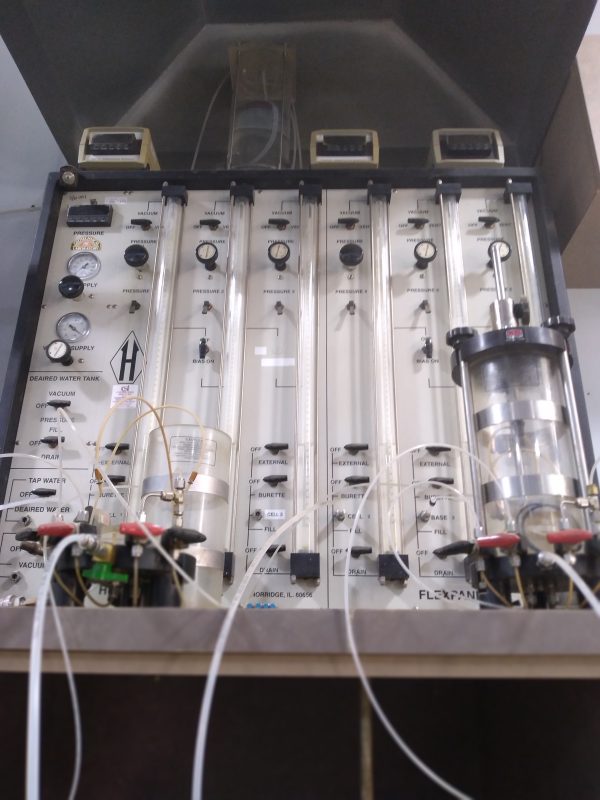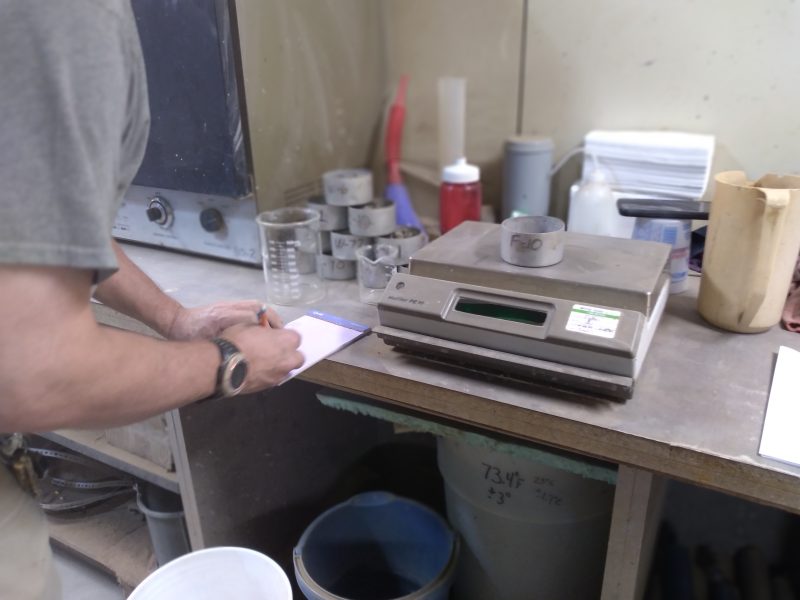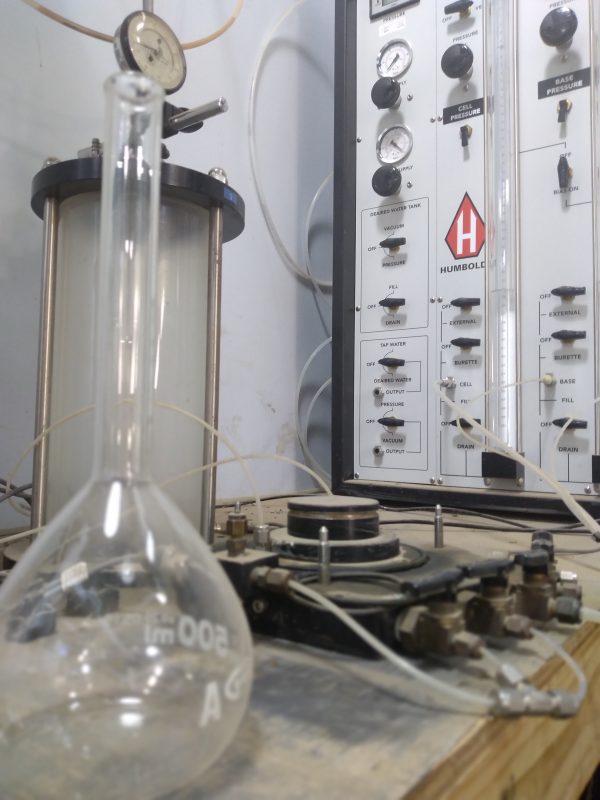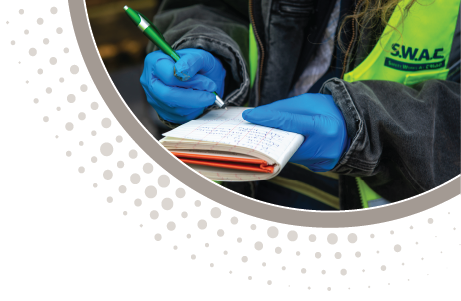Reflections from the Lab: 38 Years with Triad
 By Danny Blake, Retired Laboratory Manager – Morgantown Office
By Danny Blake, Retired Laboratory Manager – Morgantown Office
I came to Triad in a way I never expected. While going to school for my technical degree in structural building construction at Maryland State, I needed to apply for a certain number of jobs to qualify for unemployment. I saw an opening at Triad and dropped off an application, not thinking much of it. I didn’t know that one simple act would shape the rest of my life.
A year and a half later, in June of 1986, I received a call from John Kent for an interview. He offered me a position, and that’s where my time at Triad began. I started out in the field, working there for six or seven years. At the time, Roger Simar was doing all the laboratory testing. As work picked up, I transitioned into the lab full time. Once contractors realized that Triad had a staffed lab, we became busy quickly, supporting both the Morgantown and Saint Albans offices.
When I started in the lab, we used equipment that would seem out of place in a modern testing facility. We had a bread machine for mixing, a pizza oven for drying samples, and a mechanical drop hammer. Some of that equipment is still in use in labs across the country. Back then, our lab was not accredited, but we participated in AASHTO’s Round Robin program to maintain quality. In the last decade, our lab became fully accredited through several agencies, including the Army Corps of Engineers during our work on the Stonewall Jackson Dam. We also maintained accreditation with the West Virginia Department of Transportation.
After becoming full time I earned my NICET certification and worked my way from Level I to Level III. I held that certification for 20 years. Keeping it active meant completing continuing education every year, which involved staying up to date with testing standards, procedures, and industry changes. The process wasn’t easy. Each level required hands-on experience, written exams, and documentation of work performed in the field and lab. I didn’t pursue Level IV since it required a formal degree, but I was proud of the levels I did achieve. It took time, effort, and a clear understanding of the work being done every day. Holding that certification meant something to me, and it gave clients confidence in the work we provided.
When our workload spiked, I brought in field technicians to help in the lab. Over time, the labs across the company began supporting one another. We shared test results and split the workload when needed. Some tests we could not perform in-house, so we sent samples to external labs. In some cases, we sent material as far as Texas for specialty testing.
Our earliest client was Consol, and they helped establish Triad as a trusted service provider. That relationship helped cement the role of laboratory testing in our company. I often worked directly with clients to explain test results and recommend additional testing based on project needs. Request for Proposal documents didn’t always account for the local soil conditions or project-specific concerns, so I would contact clients and recommend tests that provided a more complete picture. This helped contractors ensure compliance and gave them peace of mind. If issues came up later, they could rely on the fact that they had followed all the right steps.
 I often reminded clients that we could not rush the process. Testing is regulated and monitored by federal guidelines. Each test procedure requires a minimum time frame to achieve credible results. Often clients would bring in a sample requesting a quicker than allowed turnaround time for the results. This was normally due to various reasons, most often the client had delayed bringing in their sample before the results were needed in the field so that project progress could continue. For example, a client would bring in an aggregate sample that according to contract specifications needed a Grain-Size analysis, Atterberg Limits, a Modified Proctor Curve, an LA Abrasion and a Sodium-Sulfate Soundness test, and they need the results tomorrow. I would then have to explain to the client that this time frame could not be accomplished due to the fact that the Sodium Sulfate-Soundness test alone was a 7-day test.
I often reminded clients that we could not rush the process. Testing is regulated and monitored by federal guidelines. Each test procedure requires a minimum time frame to achieve credible results. Often clients would bring in a sample requesting a quicker than allowed turnaround time for the results. This was normally due to various reasons, most often the client had delayed bringing in their sample before the results were needed in the field so that project progress could continue. For example, a client would bring in an aggregate sample that according to contract specifications needed a Grain-Size analysis, Atterberg Limits, a Modified Proctor Curve, an LA Abrasion and a Sodium-Sulfate Soundness test, and they need the results tomorrow. I would then have to explain to the client that this time frame could not be accomplished due to the fact that the Sodium Sulfate-Soundness test alone was a 7-day test.
Over time our lab progressed from doing only basic tests such as soil classifications and Maximum Density/Optimum Moisture curves to a full-service lab accredited through AASHTO, to doing more complex testing such as Triaxial Shear and Direct Shear tests, concrete and asphalt mix designs and numerous other procedures as required by project specifications.
As the lab grew and became more established, we invested in updated equipment. Our services expanded, and so did the demand. My role included explaining processes to clients and walking them through what they needed. I would also support project teams by ensuring all bond requirements and construction specs were met. That way, if an issue arose, our documentation stood up.
 I still went out in the field from time to time as the senior field technician. On many public projects, contractors are held accountable for performance over a period of time. My goal was to ensure that what we documented in the lab could protect our clients if any questions came up later.
I still went out in the field from time to time as the senior field technician. On many public projects, contractors are held accountable for performance over a period of time. My goal was to ensure that what we documented in the lab could protect our clients if any questions came up later.
While working at Triad, I heard the call to ministry. Triad supported my decision and worked with my schedule while I pursued my Master of Divinity. That degree normally takes four years, but it took me eight. During my time with the company, I officiated weddings and, sadly, a few funerals for coworkers. I never preached at work, but I was always willing to listen when someone needed to talk. Triad was more than just a job to me. I took pride in the work we did and the relationships we built.
There were times when I would hear someone criticize the company or make a comment that didn’t sit right with me. I always responded the same way: “Don’t talk about Triad that way. I am Triad.” I said it because I meant it. This company was not just a place I worked. It was something I helped build, alongside a lot of hardworking people who took pride in what they did. Triad was never about flashy marketing. We did not need billboards or ads in the paper. Our reputation was built by our employees through consistent work, honest communication, and a commitment to doing things right. That is what brought clients through the door, and more importantly, that is what brought them back. I believed that every day I came to work, and I still believe in it now. When you spend nearly four decades helping something grow, it becomes part of who you are. Triad will always be part of who I am.


